

Digital Fluency vs Digital Literacy. Response: Improve Professional Development With 'Choice, Debate, & Feedback' ECML-Programme > Programme 2016-2019 > Digital literacy. 09.11.2017e-lang - Digital literacy for the teaching and learning of languages: workshop report (Graz, Austria, 10-11 October 2017) The project workshop organised by the e-lang team was held from the 10th to the 11th of October 2017 at the ECML headquarters in Graz.
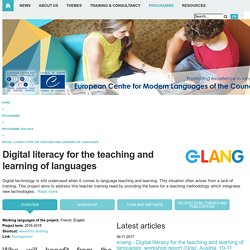
This workshop on digital literacy for the teaching and learning of languages sparked a large interest as it drew 40 participants from 34 countries (member states of the ECML and Canada). The two-day workshop involved group work and discussions sessions in a very productive atmosphere, which contributed to the successful completion of the workshop goals which were to: a) give participants the opportunity to discover real-world tasks and the pedagogical approach guiding the e-lang project and to explore the training modules developed by the e-lang project team;
A collective way for faculty to transform education. A faculty learning community, or FLC, is a group of faculty members who share a common desire to improve teaching and learning outcomes.
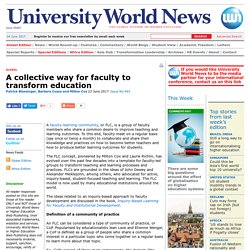
To this end, faculty meet on a regular basis (say once or twice a month) to collaborate and share their knowledge and practices on how to become better teachers and how to produce better learning outcomes for students. The FLC concept, pioneered by Milton Cox and Laurie Richlin, has evolved over the past few decades into a template for faculty-led groups to transform teaching and learning processes and practices. FLCs are grounded in the ideas of John Dewey and Alexander Meiklejohn, among others, who advocated for active, inquiry-based, student-focused teaching and learning. The FLC model is now used by many educational institutions around the world. Everyone’s a Teacher, Everyone’s a Learner – George Couros – Medium.
Can we improve school interviews Part 2. In Part 1 I reviewed some of the research around the best way to recruit and how this might apply to school recruitment.
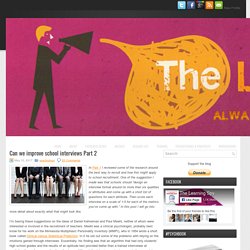
One of the suggestion I made was that schools should “design an interview format around no more than six qualities or attributes and come up with a short list of questions for each attribute. Then score each interview on a scale of 1-5 for each of the metrics you’ve come up with.” In this post I will go into more detail about exactly what that might look like. I’m basing these suggestions on the ideas of Daniel Kahneman and Paul Meehl, neither of whom were interested or involved in the recruitment of teachers. Meehl was a clinical psychologist, probably best know for his work on the Minnesota Multiphasic Personality Inventory (MMPI), who in 1954 wrote a short book called Clinical versus Statistical Prediction. OPINION: The four ways we can train teachers to use technology that hasn’t been invented yet. Education critics often see technology as unnecessary bells and whistles to a curriculum that has sufficed for decades.
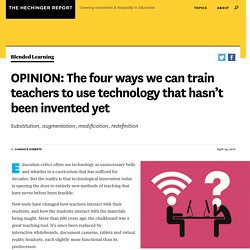
But the reality is that technological innovation today is opening the door to entirely new methods of teaching that have never before been feasible. New tools have changed how teachers interact with their students, and how the students interact with the materials being taught. More than 100 years ago, the chalkboard was a great teaching tool. It’s since been replaced by interactive whiteboards, document cameras, tablets and virtual reality headsets, each slightly more functional than its predecessor.
Changes today are not just incremental improvements of old tools. Coffee Courses – ANU Online Coffee Courses. Image by byteorder.
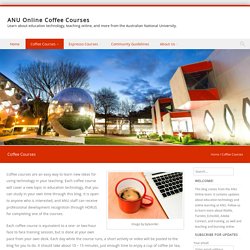
Coffee courses are an easy way to learn new ideas for using technology in your teaching. Each coffee course will cover a new topic in education technology, that you can study in your own time through this blog. It is open to anyone who is interested, and ANU staff can receive professional development recognition through HORUS for completing one of the courses.
Learning Futures Project - NETSPass: North East Tutor and Student Passport. Skip to main content Learning Futures Project - NETSPass: North East Tutor and Student Passport Summary This project from Gateshead Council developed a CPD framework, process and quality standard for enhancing the digital literacy of the teaching workforce by working collaboratively with 7 Local Authorities in the North East.
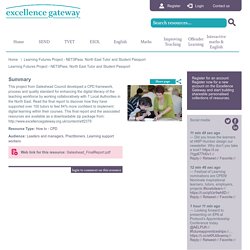
Read the final report to discover how they have supported over 100 tutors to feel 84% more confident to implement digital learning within their courses. This final report and the associated resources are available as a downloadable zip package from: 8 key steps to building a personal learning network inspired by @hrheingold. 8 key steps to building a personal learning network inspired by @hrheingold Howard Rheingold @hrheingold Whilst doing research in preparation for a keynote presentation at the University of Cambridge on the theme of ‘making connections’ I happened upon a series of tweets from Howard Rheingold.
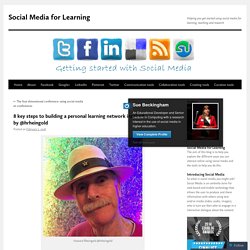
Howard has played a significant part in my digital learning journey. I have had the privilege of taking part in online courses he has facilitated, read his books and articles, as well as enjoyed many opportunities to listen in to live and recorded webinars and presentations. These experiences have lighted the curious within me and given me the confidence to explore, experiment, play, reflect and share what I have learned and encourage others to do so too. Gamification Critical Approaches.
Resources — TeachingHOW2s — Train Visual. 5 Reasons Professional Development is NOT Transforming Learning. Have you ever left a meeting, PLC, or any other professional development session wondering what the purpose of the time together was and still unclear about what is expected of you?
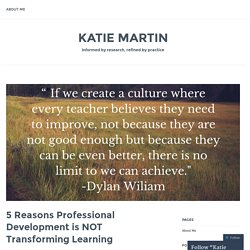
Unfortunately, you are not alone. This happens time and time again at all levels of education and then we pass on these same experiences to our students. We adopt a program or standards or new curriculum and without really understanding the goal or the underlying pedagogy, we implement and expect others to learn without first learning ourselves. Too truly create a culture, where learning is the focus for everyone, we must leverage the collective genius, as Linda Hill shares in her TedTalk, How to Manage for Collective Creativity. After reading, Five reasons your school is NOT transforming, I was inspired to dig a little deeper and share my experience in some of the major reasons that professional development is NOT transforming learning. 1. 2. 3. 4. Untitled. The use of technology to maximise the student learning experience is a vibrant area of interest across all tiers of global education.
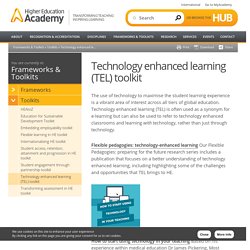
Technology enhanced learning (TEL) is often used as a synonym for e-learning but can also be used to refer to technology enhanced classrooms and learning with technology, rather than just through technology. Flexible pedagogies: technology-enhanced learning Our Flexible Pedagogies: preparing for the future research series includes a publication that focuses on a better understanding of technology enhanced learning, including highlighting some of the challenges and opportunities that TEL brings to HE.
How to start using technology in your teaching Based on his experience within medical education Dr James Pickering, Most Innovative Teacher of the Year (2014), offers a simple walkthrough highlighting the lessons he has learnt. Language Teachers Associations Roundtable. Peeking Under the Rug: Build a “Candid” Teaching Portfolio. Teaching is hard.
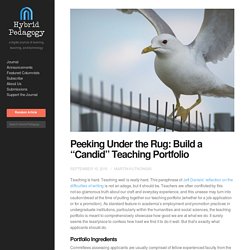
Teaching well is really hard. This paraphrase of Jeff Daniels’ reflection on the difficulties of writing is not an adage, but it should be. Teaching and Learning Conversations 2015/16. Following on from successful series during the 2013/14 and 2014 /15 academic sessions, we are delighted to announce a new programme of Teaching and Learning Conversations for 2015/16. Universities, schools and a system in flux – looking back on Carter and looking forward to the future of Initial Teacher Education in England.
In 2014 I was part of the Carter Review of ITT – an experience that was rewarding, intense and often stressful. I met a student teachers, mentors, heads, university and school based tutors, NQTs and RQTs; committed people who were very keen to tell us about their innovative and exciting approaches. The Review concluded that, though confusing, the variety of different routes is actually a strength and has a rationale. Different aspirant teachers have different needs. Introducing Technology-Enhanced Teaching. Professional Development in Digital Pedagogy. This July we are launching Digital Pedagogy Lab Courses, a series of professional development opportunities for educators, librarians, technologists, and instructional designers.
Our project has had many starts. We have started it over and over again during long walks, late night discussions, pacing in parking lots, sudden text-message chats. As with teaching and learning, Hybrid Pedagogy itself is iterative. At the core of every iteration, though, is the commitment to educational outreach, to helping teachers and learners navigate, employ, resist, and understand their work in physical and digital classrooms. But Hybrid Pedagogy was never meant to be just another peer-reviewed academic journal. We held our first digital pedagogy Twitter chat in April 2012. 5 Ways to Support Faculty who Teach with Emerging Technologies. "We must support both sides of the chasm. " Why educators can't live without social media. From student recruitment to alumni relations, social media has a place at every step of the student journey, says Eric Stoller. Institutions and educators ignore it at their peril.
Communication is at the core of the human experience. Professional Standards for Teachers and Trainers in Education and Training - England. View the video with subtitles. What’s in the standards? Download the Professional Standards 2014 (PDF – 1.8MB). Coaching v mentoring: what works best for teachers?
Four Essential Principles of Blended Learning. Eprints.ioe.ac.uk/3183/1/Daly2009CPDandICTforteachersprojectreport1.pdf. The Longer View: Edtech and 21st-Century Education. As an early Baby Boomer, born just after WWII, I began my public education in the early '50s. College got me through the '60s and I began teaching in the '70s. Since my retirement from public education, I taught in a college education department for another six years. After 40 years in the classroom, I have acquired a unique perspective on education and the constant influence of technology. Your Ultimate Guide to Giving #PechaKucha Presentations. Reclaiming Personal Learning.
Ademic Development and Quality. Centre for Professional Learning and Development. Learning and Teaching - Centre for Professional Learning and Development. Is technology making us smarter? 5 Tips to Help Teachers Who Struggle with Technology. "I'm not very tech savvy" is the response I usually hear from teachers that struggle with technology. Whether it's attaching a document to an email or creating a PowerPoint, some teachers really have a difficult time navigating the digital world.
- Three Things We Need To Remember For Every Professional Development. In Education Professional Development Guide [PUBLIC]
Video4all. Horizon Report > 2013 Higher Education Edition. Login or Create New Account Member Spotlights. Tools That College Students Wish Their Instructors Used Either More or Less – UW Bothell Learning Technologies Blog. Digital skills. Technologies. How to Get Hesitant Teachers to Use Technology. In my consulting as well as administrative technology work, I am often asked the same questions by different schools and officials. 22 Ways To Use Twitter With Bloom’s Taxonomy. LW 2013 Presentation - Petite Pipelette's Posterous. Tech Czech » “Why didn’t anyone tell me about this?”: What every learning technologist should know about accessible documents #ALTC2012. I gave this presentation at the ALT Conference 2012 in Manchester.
Presentation Download presentation from Slideshare. The redundant pyramid: how hierarchical learning structures are collapsing. 7 Habits of Highly Effective Tech-leading Principals. How Does #Edchat Connect Educators. What should a networked educational leader tweet about? How to Create a Learning Culture in Organizations. 11 Reasons Teachers Aren't Using Technology #edchat #edtech. Listening strategies: Active listening.